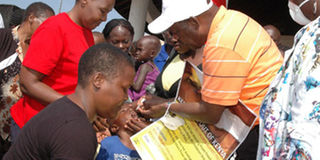Polio death and a dozen new cases trigger major alert

PHOTO | JACOB OWITI Kisumu Governor Jacktone Ranguma administers polio vaccine to a boy at Jomo Kenyatta Sports Ground after he flagged off the exercise in the county in July.
What you need to know:
- Poliomyelitis (polio) is a highly infectious viral disease, which mainly affects young children with complications like paralysis that can lead to permanent disability and death
- The disease is suspected to have originated from Somalia
- There is no cure for the disease, it can only be prevented through vaccination
A disease the World Health Organisation once declared eradicated worldwide has resurfaced in Kenya triggering a major alert.
Kenya has consequently launched mandatory polio vaccination in 22 districts after the disease killed a man in a refugee camp.
The 23-year-old Somali refugee died in the Dadaab camp a month ago, Public Health director Shahnaaz Sharif said on Monday.
The five-day campaign, which started on Saturday, will cost Sh500 million.
Poliomyelitis (polio) is a highly infectious viral disease, which mainly affects young children with complications like paralysis that can lead to permanent disability and death. According to the World Health Organisation, the virus is transmitted through contaminated food and water, and multiplies in the intestines, from where it can invade the nervous system.
Most infected people (90 per cent) have no symptoms or very mild symptoms that usually go unrecognised.
However, WHO lists fever, fatigue, headache, vomiting, stiffness in the neck, and pain in the limbs as initial symptoms of polio.
The disease is suspected to have originated from Somalia.
Dr Sharif said Kenya had recorded 12 positive tests in the recent past and two deaths, one of which was confirmed to be from polio. The cause of the second death was not established due to lack of samples as the body had already been buried.
According to Dr Sharif, the government is working with Somalia to synchronise the vaccination.
“Polio is prevented through vaccination and the occurrence of these 12 cases in Kenya means that the affected people did not get the required vaccination against polio,” said Dr Sharif in a statement.
The vaccination will mostly target children under five years.
However, in Garissa county and Habaswein district in Wajir county, adults will also be vaccinated.
Garissa Governor Nathif Adan had the oral polio dose administered on him by Dr Sharif on Saturday to assure adults on the safety of the vaccine and encourage people in the affected regions to be vaccinated.
Most adults do not need the polio vaccine because they received it as children. However, three groups of adults are at higher risk and should consider vaccination.
According to the Centres for Disease Control and Prevention, those travelling to polio-endemic or high-risk areas need a dose of the vaccine.
So do health care workers who handle specimens that might contain the polio virus and those treating patients who could have polio.
The five-day campaign hopes to reach 4.9 million persons in the targeted regions including Nairobi, Mandera, Marsabit, Isiolo, Siaya, Homa Bay and Migori. Other counties are Kisumu, Mombasa, Kilifi, Kwale, Lamu, Baringo and Turkana (including Kakuma refugee camp).
There is no cure for the disease, it can only be prevented through vaccination. This year only three countries (Afghanistan, Nigeria and Pakistan) remain polio-endemic, down from more than 125 in 1988.
Failure to stop polio in these last remaining areas could result in as many as 200,000 new cases worldwide every year, within 10 years.
In July this year 30,000 children in Teso South District were immunised against the disease.
Last week a vaccination campaign was taken to Israel after it was found that between 1,000 and 2,000 people living in the south of the Middle East country are healthy carriers of the virus.
In March this year DRC, which had battled re-infection for seven years, became polio free.




